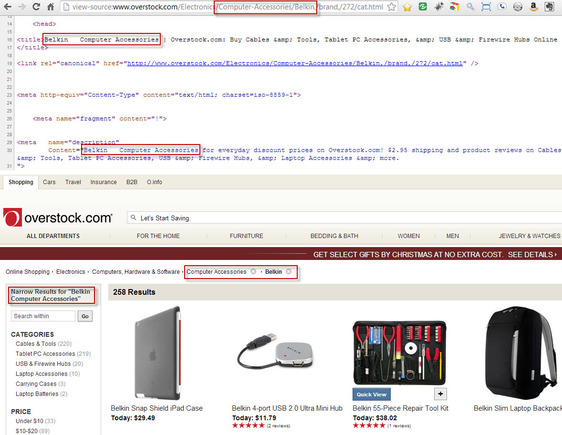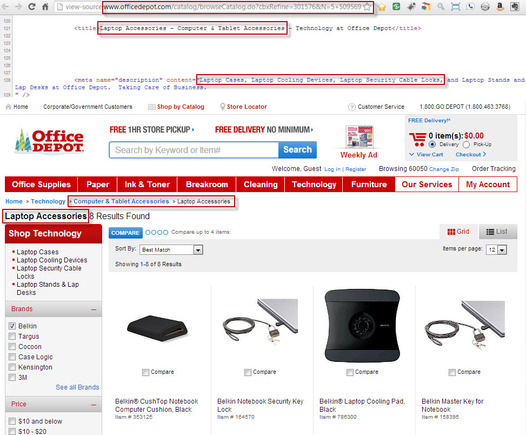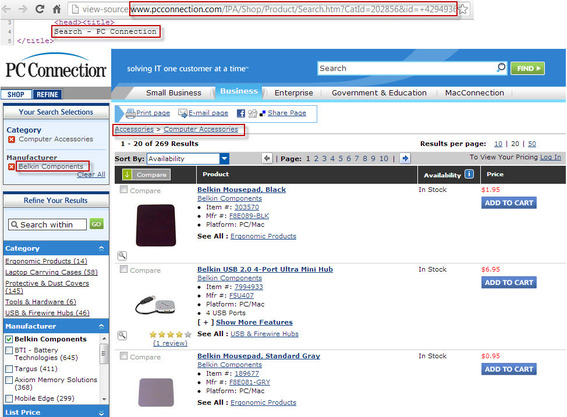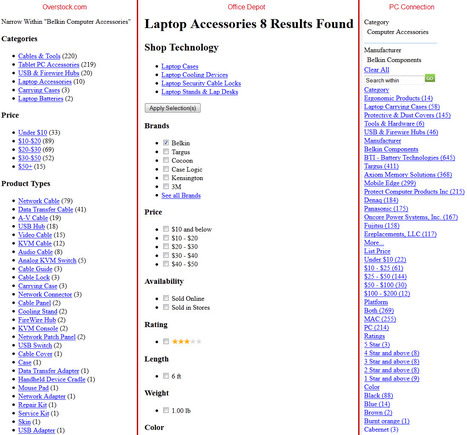Ecommerce sites rely on filtered or faceted navigation to make their product catalogs more easily digestible for customers. Depending on how filters and facets are implemented, however, they can either be fantastic for search engine optimization or a big failure.
SEO is based on three pillars: crawler access, keyword relevance, and authority. Filters and facets affect the first two of these pillars, access and relevance. Depending on which platform is used and how it’s implemented, faceted navigation and filters can act as crawl barriers for search engines or produce tremendous amounts of duplicate content. That’s the access issue. If a search engine’s crawler can’t or doesn’t access certain pages on the site, those pages have no chance of being indexed, ranking or driving organic search traffic.
On the relevance front, pages created by filters and facets are often treated as subsets of the unfiltered page. As a result they aren’t allowed to display unique title tags, headings meta descriptions and other textual signals that would alert search engines to their unique content. Filtered and faceted pages may contain subsets of products that have high search value, but if the page isn’t allowed to display keyword signals targeting unique keywords, the page looks to a search engine nearly identical to the unfiltered page and all of its other filtered variants.
Example: When Facets and Filters Work for SEO
For example, when searching Google for the phrase “computer accessories” — 3,600 searchers do that each month — Overstock.com ranks in the third position, Office Depot is spot number eight, and PC Connection rounds up the first page in tenth place. Each of these ranking pages is a category or subcategory page linked from the primary navigation. As such they’re easily accessible to search engine crawlers, have relevant anchor text, and optimized on-page elements like title tags and headings to declare their keyword relevance.
The picture changes radically when the search results are filtered or narrowed using the faceted navigation feature on each of these sites. If the Google search is narrowed to “Belkin computer accessories,” Overstock ranks number two behind Belkin’s own site. Office Depot and PC Connection fall out of the top 50 Google search results, though. What is Overstock doing so well that Office Depot and PC Connection lack?
Overstock’s Belkin Computer Accessories Page Enlarge This Image
Enlarge This Image

The page on Overstock that ranks number two in Google for “Belkin computer accessories” has implemented faceted navigation optimally for SEO to enable crawler access and send keyword relevance signals. Office Depot and PC Connection have not.
The image above shows the source code for Overstock’s Belkin Computer Accessories page and the page that displays when you visit in your browser. Highlighted in red are the elements that Overstock’s faceted navigation feature inserts into the page to allow it to send unique keyword signals: title tag, meta description, H1 heading, breadcrumb, URL. If the platform hadn’t been implemented to insert these keyword signals, this page specific to Belkin brand computer accessories would look exactly like its unfiltered parent page, Computer Accessories. It would have the same title tag and other SEO elements listed above as hundreds of pages in the Computer Accessories product subcategory.
In addition, Overstock has ensured that it implemented faceted navigation that is crawlable. Remember that search engines don’t accept cookies, and don’t traditionally execute CSS or JavaScript commands. With those three technologies disabled, Overstock’s faceted navigation remains crawlable via plain HTML text links. This is critical to enabling search crawlers to index every valuable page in the site.
Example: When Facets and Filters Fail SEO
Office Depot and PC Connection haven’t fared as well in the implementation of their faceted navigation for SEO benefit. They work nicely for customers — no argument there. But Google isn’t your average customer. Google, Bing, Yahoo! and their brothers need special concessions to help them access the site and more direct textual signals as to each page’s relevance.
Office Depot’s Belkin Laptop Accessories Page






Office Depot’s implementation is challenged with both access and relevance. The page closest to “Belkin computer accessories” is Belkin Laptop Accessories page. The title tag, headings and all other textual signals on the page are identical to the unfiltered Laptop Accessories page and all of its hundreds of filtered variations. The only difference in page content is that all of the product names contain “Belkin,” which isn’t enough for Office Depot to rank for this page.
The bigger problem Office Depot faces with faceted navigation, however, is access. Google hasn’t indexed Belkin Laptop Accessories page, so it has no chance of ranking or driving organic search traffic or sales. Navigating the filters like brand and color require JavaScript and the ability to execute a simple form.
Technically, Google’s crawlers are advanced enough to complete simple forms like this. The question is, “Will Google bother?” Chances are, Google will execute a sampling of forms on the site, crawl the pages and determine if the content is unique and relevant enough to continue crawling the rest of the hundreds of options the form presents. When coupled with a lack of textual relevance signals the answer is typically no, Google will not bother to use its limited resources to continue crawling content that appears to have little unique search value.
PC Connection’s Belkin Computer Accessories Page






PC Connection, on the other hand, has a slightly different challenge. Its faceted navigation pages show no evidence of optimization. They’re essentially standard search result pages with a generic search result title tag, no meta description, no defined headings, and breadcrumbs that stop when the facets start. The only clue that this is a Belkin Computer Accessories specific page is the appearance of “Belkin Components” in the “Your Search Selections” section at the top of the right navigation. As a result, PC Connection shares Office Depot’s keyword relevance issues.
PC Connection’s crawler access challenges are different, however. Technically, PC Connection’s faceted navigation is perfectly crawlable and the page is actually indexed. Interestingly, the site has a block on all faceted navigation pages via a disallow command in their robots.txt file. So even though the navigation is technically crawlable as implemented, the robots.txt file commands search engines not to crawl the faceted pages. It’s common to disallow internal site search results since the search engines won’t rank them in the search results anyway, but disallowing facets feels like a mistake in this case.
Comparing Crawler Access
Faceted Navigation from a Search Engine’s Perspective






To clarify the crawler access challenges, let’s look more closely at the three sites’ faceted navigation implementations from a search engine’s perspective. These three navigation chunks illustrate what the Belkin pages we’ve been discussing look like with cookies, JavaScript and CSS disabled. The facets and filters available as blue underlined links are easily accessible to search engines. Overstock and PC Connection’s facets are all blue underlined links. These pages will be crawled, judged algorithmically, indexed, and are eligible to rank in search results (except in PC Connections’ case because of the robots.txt disallow).
The facets on Office Depot’s navigation, however, are not blue underlined links. They still show a checkbox that executes the facet only when the “Apply Selection(s)” button is clicked. These checkboxes are a red flag that Office Depot’s facets will present a challenge to crawling, indexation and ultimately ranking and sales. As discussed earlier, if Office Depot’s keyword relevance signals were outstanding, Google may bother indexing more of these pages. But it’s still a barrier to optimal indexation, which in turn is a barrier to maximizing your organic search sales across your site, no matter how stellar your keyword relevance is.
SEO is often described as a war of a thousand small battles. Faceted navigation bundles up a lot of those small battles into a single set of implementation decisions on a platform integration project. Each page in your product catalog is a soldier in the war for search engine rankings and organic search sales. Search engine crawler access and keyword relevance are critical to enabling that product page army to fight hard and win customers. Implement facets and filters with SEO in mind to greatly improve your site’s chances of winning rankings and driving sales.





